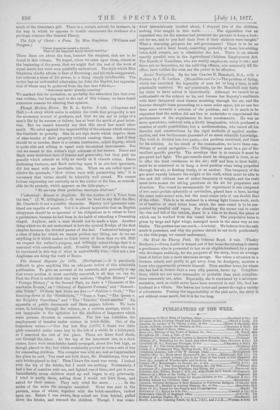The Annual Register for 3876. (Riviugtons.)—It is peculiarly difficult to
give anything like an adequate notice of this admirable publication. To give an account of its contents, and generally to say that every portion is most carefully executed, is all that we can do. Part the First is subdivided into two sections, "English History" and "Foreign History ;" in the Second Part, we have a "Chronicle of Re- markable Events," an "Obituary of Eminent Persons," and "Remark- able Trials." Of those last there arc five :—" Jenkins v. Cook," "The Running-down of the Strathclyde,'" "Vane v. Vane," "The Queen v. the Keighley Guardians," and"The Tenedes' Court-martial." An appendix of public doeuments and State papers follows. We have come, in looking through the volume, on a curious passage, which is not inapposite to the agitation for the abolition of Inspectors which some persons threaten to commence. The law has forbidden the employment of females under sixteen in brick-flelde. One of the Inspectors writes :—" One day last May (1875) I found two little girls concealed under some hay in the loft of a stable in a brickyard, so I searched the rest of the place. There are three fitted sheds, one through the other. At the top of the innermost one, in a dark corner, there were some bricks neatly arranged, about five feet high, as though placed to dry, but which eventually proved to form a sort of box for concealing children. The occupier was with me, and as I approached the place he said, You need not look there, Mr. Blonkinsopp, they are only bricks placed to dry.' Then I know the scent was warm. I looked over the top of the bricks, but I could see nothing. Fortunately, I bad a box of matches with me, and lighted one of them, and put it over. Immediately seven children stood up and began to cry grievously. I tried to pacify them, telling them I would not hurt them, and asked for their names. They only cried the more In the midst of the noise the occupier vanished. News was sent to the parents, some of whom, together with the brick-moulders, rushed upon me. Before I was aware, they seized me from behind, pulled down the bricks, and rescued the children. Though I was some- what ignominiously hustled about, I stopped two of the childrorr, making four caught in this work The opposition was an organised one, for the masters had promised the parents to keep a look- out for me, and to pay half their fines if their children wore caught." What a charming prospect for self-government! There is to be no inspector, and a local board, consisting probably of these law-abiding brick-field owners, are to administer the Act. There is an almost exactly parallel case in the Agricultural Children Employment Act. The Boards of Guardians, who are mostly employers, carry it out ; and there are no inspectors, for the relieving officers, who nominally fill the office, have neither the wish nor the power to be effective.


































 Previous page
Previous page